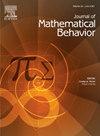From oral counting to plotting graphs: Advances in girls' math education in the South of Brazil
IF 1
Q3 EDUCATION & EDUCATIONAL RESEARCH
引用次数: 0
Abstract
Throughout the 19th century in southern Brazil, as in the whole country, girls received a poorer mathematical education than boys. Historical records of this education are scarce. The first systematic opportunity for girls to progress beyond basic arithmetic was by pursuing training as elementary school teachers. In the 20th century, several movements converged to reduce inequalities: coeducation became standard in primary schools, secondary education was standardized, and both coeducational and girls’ secondary schools expanded rapidly. The first part of this text presents a systematic review of the sparse records found on mathematical education for girls until 1930. The second part compares school notebooks and the existing curriculum to examine traces of the mathematics studied in a girls' secondary school created in 1948. The regulation and expansion of secondary education allowed girls to study mathematical topics in algebra, deductive geometry, problem-solving, and introductory functions.
从口头计数到绘图:巴西南部女孩数学教育的进展
整个19世纪,在巴西南部,就像在整个国家一样,女孩接受的数学教育比男孩差。关于这种教育的历史记录很少。女孩第一次有系统地超越基本算术的机会是参加小学教师培训。在20世纪,一些运动汇聚在一起以减少不平等:男女同校成为小学的标准教育,中等教育标准化,男女同校和女子中学都迅速扩大。本文的第一部分提出了一个系统的审查稀疏的记录发现,直到1930年的女孩数学教育。第二部分比较了学校笔记和现有课程,以考察1948年创建的一所女子中学学习数学的痕迹。中学教育的规范和扩展使女孩能够学习代数、演绎几何、解决问题和入门函数等数学主题。
本文章由计算机程序翻译,如有差异,请以英文原文为准。
求助全文
约1分钟内获得全文
求助全文
来源期刊

Journal of Mathematical Behavior
EDUCATION & EDUCATIONAL RESEARCH-
CiteScore
2.70
自引率
17.60%
发文量
69
期刊介绍:
The Journal of Mathematical Behavior solicits original research on the learning and teaching of mathematics. We are interested especially in basic research, research that aims to clarify, in detail and depth, how mathematical ideas develop in learners. Over three decades, our experience confirms a founding premise of this journal: that mathematical thinking, hence mathematics learning as a social enterprise, is special. It is special because mathematics is special, both logically and psychologically. Logically, through the way that mathematical ideas and methods have been built, refined and organized for centuries across a range of cultures; and psychologically, through the variety of ways people today, in many walks of life, make sense of mathematics, develop it, make it their own.
 求助内容:
求助内容: 应助结果提醒方式:
应助结果提醒方式:


